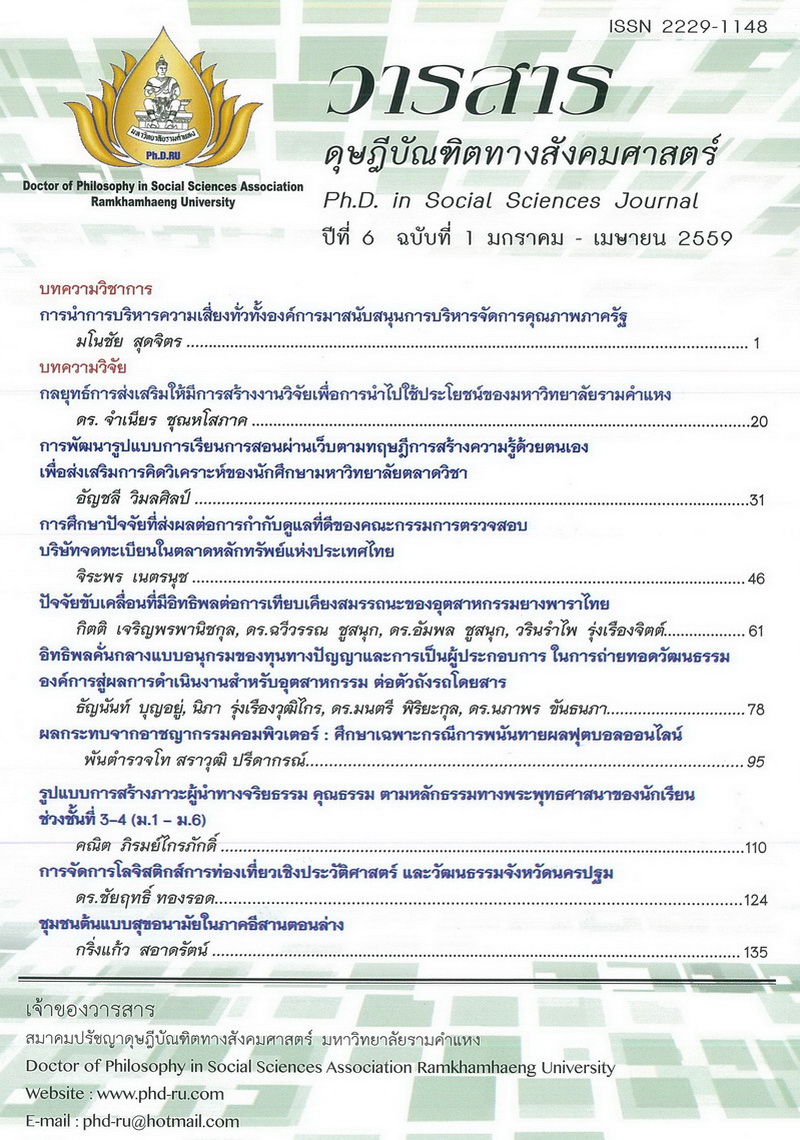อิทธิพลคั่นกลางแบบอนุกรมของทุนทางปัญญาและการเป็นผู้ประกอบการในการถ่ายทอดวัฒนธรรมองค์การสู่ผลการดำเนินงานสำหรับอุตสาหกรรมต่อตัวถังรถโดยสาร
Main Article Content
Abstract
ผลการวิจัยเชิงปริมาณ พบว่า วัฒนธรรมองค์การ ทุนทางปัญญา การเป็นผู้ประกอบการ และ ผลการดำเนินงานขององค์การมีค่าเฉลี่ยรวมอยู่ในระดับมาก เมื่อพิจารณาองค์ประกอบของแต่ละปัจจัยเป็น รายด้าน พบว่า วัฒนธรรมองค์การ ทุนทางปัญญา การเป็นผู้ประกอบการ และผลการดำเนินงานขององค์การ ทุกด้านมีค่าเฉลี่ยอยู่ในระดับมากเช่นกัน
ผลการวิเคราะห์ตัวแบบสมการโครงสร้างปัจจัยที่มีอิทธิพลต่อผลการดำเนินงานขององค์การ พบว่า วัฒนธรรมองค์การมีอิทธิพลทางตรงต่อทุนทางปัญญา (TE = 0.553) และผลการดำเนินงานของ องค์การ (TE = 0.277) และมีอิทธิพลทางอ้อมต่อการเป็นผู้ประกอบการ (TE = 0.357) และผลการดำเนิน งานขององค์การ (TE = 0.143) ส่วนทุนทางปัญญามีอิทธิพลทางตรงต่อการเป็นผู้ประกอบการ (TE = 0.646) และมีอิทธิพลทางอ้อมต่อผลการดำเนินงานขององค์การ (TE = 0.259) และส่วนการเป็นผู้ประกอบการมี อิทธิพลทางตรงต่อผลการดำเนินงานขององค์การ (TE = 0.401)
ผลการวิจัยเชิงคุณภาพ พบว่า วัฒนธรรมองค์การ ทุนทางปัญญา การเป็นผู้ประกอบการ และผล การดำเนินงานขององค์การสอดคล้องกับการวิจัยเชิงปริมาณ นอกจากนี้แล้วยังได้ข้อค้นพบที่เป็นทฤษฎีที่ สร้างจากข้อมูล (ทฤษฎีฐานราก) คือ ผลการดำเนินงานขององค์การ (firm performance) ได้รับอิทธิพล จากการจัดการเชิงกลยุทธ์ (strategy management) และการสนับสนุนจากภาครัฐ (government support) โดยมีเทคโนโลยี (Technology) เป็นปัจจัยที่อาจเปลี่ยนความสัมพันธ์ระหว่างการสนับสนุนจาก ภาครัฐและผลการดำเนินงานขององค์การ
Serial Mediated Effects of Intellectual Capital and Entrepreneurship in Transmitting Organizational Culture to Performance of Bus Body Industry
This research aimed to study organizational culture, intellectual capital, entrepreneurship, and organizational performance, including study intellectual capital and entrepreneurship as serial mediated variables connecting organizational culture to the performance of Thai medium enterprise in bus body industry. Sample groups used for this quantitative research were 100 samples of bus body industry entrepreneurs. Tools used in this research were questionnaires. Statistics used in this research were analyses by percentage, standard deviation, and PLS Graph 3.0 structural equation analysis. On the other hand, the qualitative research, in-depth interviews were used with 9 bus body industry entrepreneurs to confirm the researcher’s research framework developed from studies of related literature. Later, the research results were summarized, discussed, and suggestions were given in a form of descriptive analysis.
Quantitative research results found that organizational culture, intellectual capital, entrepreneurship, organizational performance, had an averaged total at a high level. When aspects of each variable were considered, it was found that organizational culture, intellectual capital, entrepreneurship, and organizational performance, all had an averaged value at a high level, too.
The results of the analysis of the model of the structural equation of the factors effecting the organizational performance found that organizational culture had direct influence to intellectual capital (TE = 0.553) and organizational performance (TE = 0.277) and indirect influence to entrepreneurship (TE = 0.357) and organizational performance (TE = 0.143). On the other hand, intellectual capital had direct influence to entrepreneurship (TE = 0.646) and had indirect influence to organizational performance (TE = 0.259). In addition, entrepreneurship had direct influence to organizational performance (TE = 0.401).
Qualitative research results found that organizational culture, intellectual capital, entrepreneurship, and organizational performance conformed to the results of the quantitative research. Besides, there was a basic theoretical discovery that organizational firm performance was influenced by strategy management and government support, by which technology might be the factor in changing relationship between government support and organizational performance.
Article Details
Academic articles, research articles, and book reviews in the Ph.D. in Social Sciences Journal are author’s opinions, and not the publisher’s, and is not the responsibility of the Ph.D. in Social Sciences Journal Philosophy Association, Ramkhamhaeng University. (In the case that research is done on human, the researcher has to be trained in Ethics for Doing Research on Human Training and has to produce the evidence of the training).


